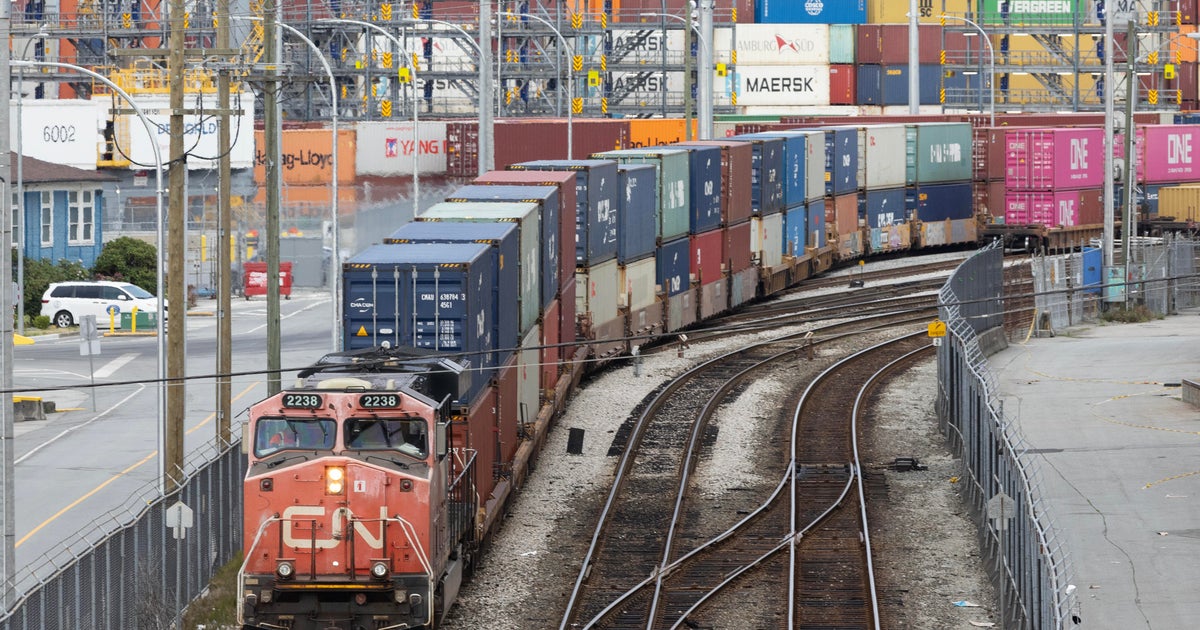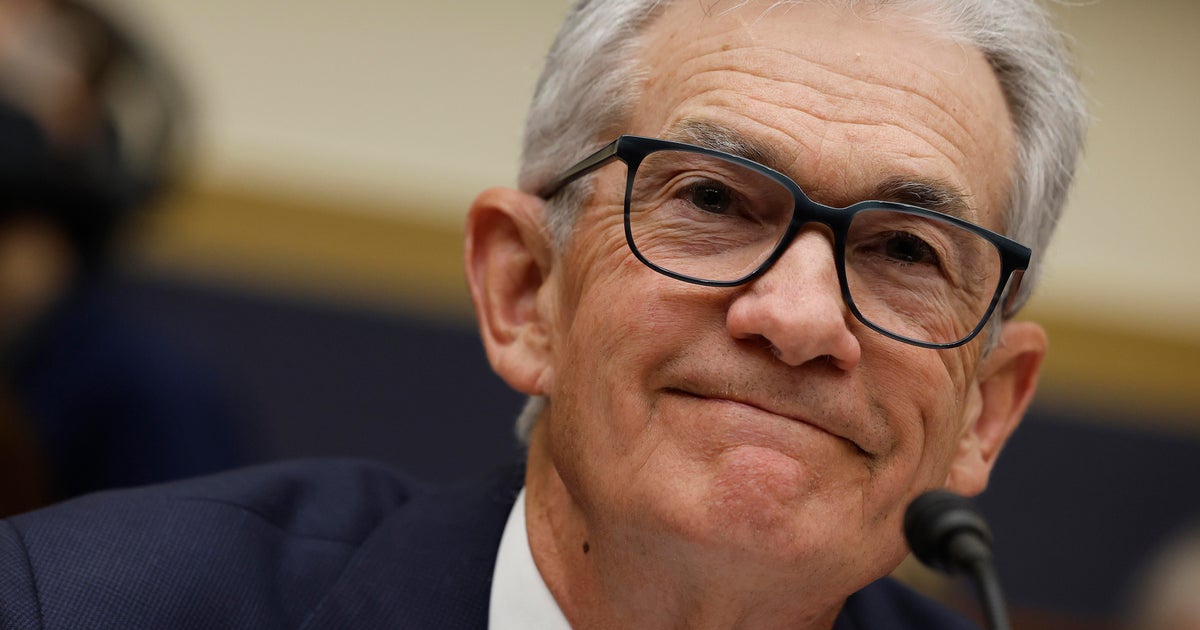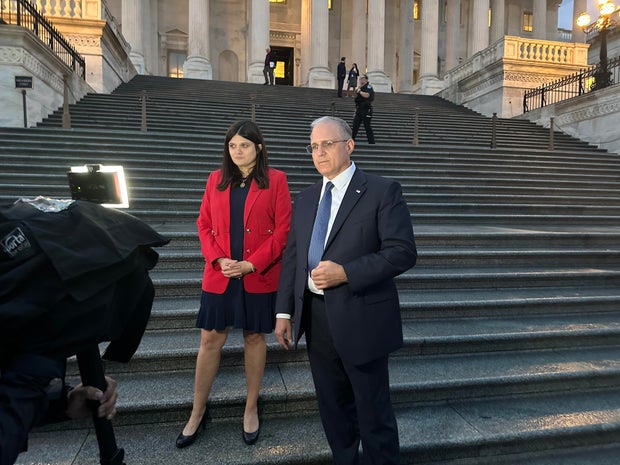CBS News
Canada’s freight train shutdown to end as government orders arbitration of labor dispute

Freight trains in Canada were expected to roll again soon after the government forced a contract dispute into arbitration Thursday, averting potentially dire economic consequences for businesses and consumers across the country and in the U.S.
Labour Minister Steven MacKinnon announced the decision to order the arbitration between the country’s two major freight railroads — Canadian National and CPKC — and Teamsters Canada Rail Conference, the union representing nearly 10,000 engineers, conductors and dispatchers.
MacKinnon’s announcement came moments after The Associated Press broke the news publicly, citing an official familiar with the situation who was not allowed to speak publicly before the announcement.
Both CN and CPKC have said that once the dispute enters arbitration the trains will be able to move again, but it wasn’t immediately clear how quickly that would happen. MacKinnon said he expects it will be within days.
The railroads locked out their employees after a 12:01 a.m. EDT deadline to resolve the dispute with the union passed without agreements.
Talks resumed later in the day — as workers picketed outside and business groups urged the government to force the arbitration.
MacKinnon said the government wanted to give negotiations every chance to succeed, but ultimately the economic risk was too great to allow the lockouts to continue. He had declined to order arbitration a week ago.
“Canada’s economy cannot wait for an agreement that has been delayed for a very long time and when there is a fundamental disagreement between the parties,” he said.
All of Canada’s freight handled by rail — worth more than $1 billion Canadian (US$730 million) a day and adding up to more than 375 million tons of freight last year — stopped Thursday along with rail shipments crossing the U.S. border. About 30,000 commuters in Canada were also affected because their trains use CPKC’s lines. CPKC and CN’s trains continued operating in the U.S. and Mexico during the lockout.
Andrew Chin / Getty Images
Many companies in both countries and across all industries rely on railroads to deliver their raw materials and finished products, so they were concerned about a crisis without regular rail service. Billions of dollars of goods move between Canada and the U.S. via rail each month, according to the U.S. Department of Transportation.
Paul Boucher, president of the Teamsters Canada Rail Conference, said Thursday morning that he believed the railroads were “holding the Canadian economy hostage to try and pressure the Liberal government to impose final binding arbitration and take your rights away to free collective bargaining.”
Trudeau decided not to force the parties into binding arbitration before the deadline passed for fear of offending unions and the leftist NDP party that his Liberal government relies on for support to remain in power.
In anticipation of the work stoppage, the White House convened a multi-agency Supply Chain Disruptions Task Force to assess the potential impact on U.S. consumers, businesses and workers, according to a Biden administration official. The official was not authorized to comment publicly and spoke on the condition of anonymity.
Most businesses probably have enough supplies on hand and room to store finished products to withstand a brief disruption. But ports and other railroads would have quickly become clogged with stranded shipments that Canadian National and CPKC won’t pick up.
Edward Jones analyst Jeff Windau said many companies made supply chain changes after the COVID-19 pandemic that can help them withstand a short disruption. The real trouble starts if it drags on.
Most previous Canadian rail stoppages have only lasted a day or two and usually involved only one of the big railroads, but some have stretched as long as eight or nine days. The impact was magnified this time because both railroads had stopped.
“They are so integrated and tied into the economy,” Windau said. “Just the breadth of products that they haul. … Ultimately, I think we need the rails to continue to be running.”
Chemical businesses and food distributors would have been the first to be affected. The railroads stopped accepting new shipments of hazardous materials and perishable goods as they began gradually shutting down last week, but most chemical plants had said they would be OK for about a week.
The auto industry also may have seen problems quickly because it relies on just-in-time shipments, with significant cross-border deliveries of engines, parts and finished vehicles. Flavio Volpe, President of the Automotive Parts Manufacturers’ Association, posted on X that about four of every five cars made in Canada are exported to the U.S. almost exclusively by rail. He said a prolonged lockout could cause temporary work stoppages similar to the impact of the five-day 2022 Ambassador Bridge blockade.
Union Pacific, one of the U.S. railroads that regularly hands off shipments to and from the Canadians, said the stoppage meant that “thousands of cars per day will not move across the border.”
“Everything from grain and fertilizer during the critical summer season, and lumber for building homes could be impacted,” Union Pacific said in a statement Thursday.
More than 30,000 commuters in Vancouver, Toronto and Montreal were the first to feel the pain of the lockouts. They had to scramble Thursday morning to find a new way to work because their commuter trains aren’t able to operate while CPKC is shut down.
CN had been negotiating with the Teamsters for nine months while CPKC had been trying to reach an agreement for a year, the union said.
The Canadian negotiations are stuck on issues related to the way rail workers are scheduled and concerns about rules designed to prevent fatigue and provide adequate rest to train crews. Both railroads had proposed shifting away from the existing system, which pays workers based on the miles in a trip, to an hourly system that they said would make it easier to provide predictable time off. The union said it doesn’t want to lose hard-fought fatigue protections.
The railroads said their contract offers have included raises consistent with recent deals in the industry. Engineers already make about $150,000 a year on Canadian National while conductors earn $120,000, and CPKC says its wages are comparable.
CBS News
JD Vance echoes Trump, blames Democrats for apparent assassination attempt

Watch CBS News
Be the first to know
Get browser notifications for breaking news, live events, and exclusive reporting.
CBS News
9/17: The Daily Report with John Dickerson

Watch CBS News
Be the first to know
Get browser notifications for breaking news, live events, and exclusive reporting.
CBS News
Paul Whelan, freed in prisoner swap with Russia, tells other American detainees: “We’re coming for you”

Washington — Nearly seven weeks after the Russians handed over Paul Whelan on a tarmac in Ankara, Turkey, the Marine veteran stood on the steps of the U.S. Capitol with a message for other Americans who are held abroad.
“We’re coming for you,” he told reporters Tuesday night after he met with lawmakers. “It might take time, but we’re coming.”
Whelan said he spoke with lawmakers about how the government can better support detainees after they’re released.
“We spoke about how the next person’s experience could be better,” he said. “What the government could do for the next person that’s held hostage and comes home — the care and support that other people might need, especially people that are in a worse situation. There are people coming back that lived in the dirt without shoes for three years, people that were locked up in hideous conditions for 20 years. They need support.”
CBS News
The U.S. secured Whelan’s release in August in one of the largest prisoner swaps since the end of the Cold War. The complex deal came after months of sensitive negotiations between the U.S., Russia, Germany, Slovenia, Poland and Norway.
As part of the deal, Russia released 16 prisoners while the Western countries released eight Russians. Whelan was released alongside Wall Street Journal reporter Evan Gershkovich, Russian-American radio journalist Alsu Kurmasheva and Vladimir Kara-Murza, a U.S. green card holder and Kremlin critic.
Whelan, who had been the longest-held American detainee in Russia, was arrested in December 2018 when he traveled to the country to attend a friend’s wedding. He was convicted of espionage in a secret trial and sentenced to 16 years in prison in 2020.
Whelan, his family and the U.S. government vehemently denied that he was a spy and accused Russia of using him as a political pawn. The U.S. government considered him to be wrongfully detained, a rare designation that put more government resources toward securing his release.
But a deal to secure his freedom was long elusive. He remained behind bars as Russia freed Marine veteran Trevor Reed and women’s basketball star Brittney Griner — both of whom were detained after Whelan’s arrest — in prisoner swaps with the U.S.
The U.S. said it pushed for his inclusion in both exchanges, but Russia refused. It led to Whelan advocating for his own release from a remote prison camp, calling government officials and journalists to make sure that he wasn’t forgotten.
When the plane carrying Whelan, Gershkovish and Kurmasheva landed in Maryland on Aug. 1, Whelan was the first to disembark. He was greeted by President Biden, who gave Whelan his American flag pin, and Vice President Kamala Harris.
“Whether he likes it or not, he changed the world,” Rep. Haley Stevens, a Michigan Democrat, told reporters Tuesday.
Whelan’s case and his family’s constant pressure on the U.S. government brought more attention to the cases of Americans who are wrongfully detained by foreign governments.
Haley said Whelan is a reminder to other Americans considering traveling to Russia that “you have a target on your back.”
Whelan said it’s been an adjustment acclimating to life back in the U.S., especially learning the latest technology like his iPhone 15.
“I was in a really remote part of Russia,” he said. “We really didn’t have much. The conditions were poor. The Russians said the poor conditions were part of the punishment. And coming back to see this sort of thing now is a bit of a shock, but it’s a good shock.”









